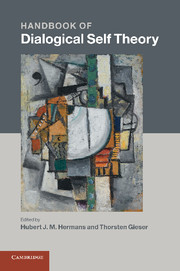Book contents
- Handbook of Dialogical Self Theory
- Handbook of Dialogical Self Theory
- Copyright page
- Contents
- Figures
- Tables
- Contributors
- Epigraph
- Introductory chapter
- Part I Theoretical contributions
- 1 Positioning in the dialogical self: recent advances in theory construction
- 2 Time and the dialogical self
- 3 Developmental origins of the dialogical self: early childhood years
- 4 Self-making through synthesis: extending dialogical self theory
- 5 Multiculturalism, multiple identifications and the dialogical self: shifting paradigms of personhood in sociocultural anthropology
- 6 Acculturation and the dialogical formation of immigrant identity: race and culture in diaspora spaces
- 7 Psychodrama: from dialogical self theory to a self in dialogical action
- 8 Identity construction among transnational migrants: a dialogical analysis of the interplay between personal, social and societal levels
- 9 Negotiating with autonomy and relatedness: dialogical processes in everyday lives of Indians
- 10 Dialogicality and the internet
- 11 Schizophrenia and alterations in first-person experience: advances offered from the vantage point of dialogical self theory
- 12 The dialogical self in the new South Africa
- Part II Methods for studying the dialogical self
- Part III Domains of application
- Epilogue
- Index
10 - Dialogicality and the internet
from Part I - Theoretical contributions
Published online by Cambridge University Press: 05 June 2012
- Handbook of Dialogical Self Theory
- Handbook of Dialogical Self Theory
- Copyright page
- Contents
- Figures
- Tables
- Contributors
- Epigraph
- Introductory chapter
- Part I Theoretical contributions
- 1 Positioning in the dialogical self: recent advances in theory construction
- 2 Time and the dialogical self
- 3 Developmental origins of the dialogical self: early childhood years
- 4 Self-making through synthesis: extending dialogical self theory
- 5 Multiculturalism, multiple identifications and the dialogical self: shifting paradigms of personhood in sociocultural anthropology
- 6 Acculturation and the dialogical formation of immigrant identity: race and culture in diaspora spaces
- 7 Psychodrama: from dialogical self theory to a self in dialogical action
- 8 Identity construction among transnational migrants: a dialogical analysis of the interplay between personal, social and societal levels
- 9 Negotiating with autonomy and relatedness: dialogical processes in everyday lives of Indians
- 10 Dialogicality and the internet
- 11 Schizophrenia and alterations in first-person experience: advances offered from the vantage point of dialogical self theory
- 12 The dialogical self in the new South Africa
- Part II Methods for studying the dialogical self
- Part III Domains of application
- Epilogue
- Index
Summary
Keywords
Information
- Type
- Chapter
- Information
- Handbook of Dialogical Self Theory , pp. 185 - 199Publisher: Cambridge University PressPrint publication year: 2011
Accessibility standard: Unknown
Why this information is here
This section outlines the accessibility features of this content - including support for screen readers, full keyboard navigation and high-contrast display options. This may not be relevant for you.Accessibility Information
- 1
- Cited by
